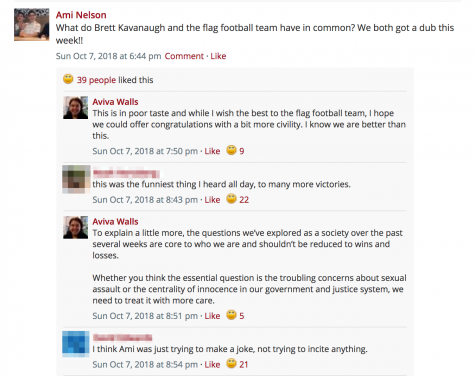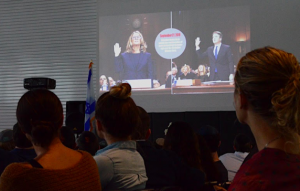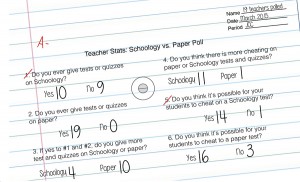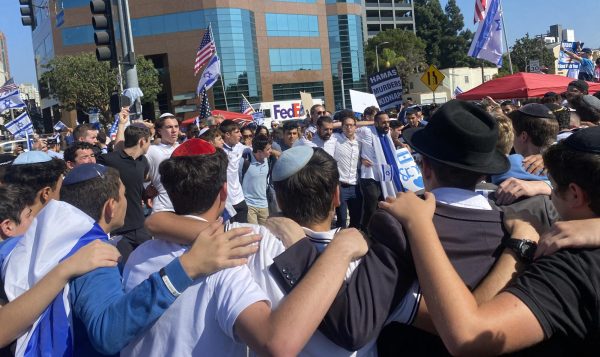Call for emails to senators starts dispute over politics on Schoology
Some have called the past two years the most divided time in American history. Last month, that division spilled onto Schoology — Shalhevet’s online system for everything from attendance and quiz grades to club meetings, chesed opportunities and missing smartphones — and some now are calling for political speech to be banned on the platform.

It started when one student posted a link for emailing senators undecided about how to vote on Brett Kavanaugh; that post received 16 comments of both support and disagreement, some praising the senators’ eventual decisions.
A few days later, another student celebrated a win by the flag football team with a Schoology comment that both the team and Kavanaugh were celebrating victories; that comment was criticized by an administrator, leading to more controversy and some bad feelings.
“Schoology is a platform to inform students and faculty members of events and assignments that are due,” said junior Joseph Klores in an interview. “It lacks a public forum of debate and dialogue.”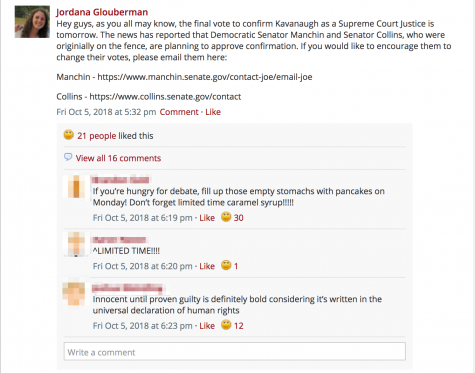
Joseph was among those who objected to the original post about emailing senators, But senior Jordana Glouberman, who wrote the original post, thought it was a reasonable use of the schoolwide information system.
“The Kavanaugh situation was obviously a really big situation throughout America and there were a lot of different sides to it,” Jordana said later. “But it’s also something that seemed kind of far away and out of our hands, so I just wanted to present the opportunity to people to try to do something about it if they wanted to, and show people that they could take action if they choose to do so.”
The current questions about Schoology started Oct. 5, the day before the Senate was to hold a vote on Justice Kavanaugh’s confirmation to the Supreme Court. Jordana posted contact information for senators Joe Manchin, Democrat of West Virginia, and Susan Collins, Republican of Maine. Both were known to be undecided about their votes, meaning their opinions could possibly be changed.
“The news has reported that Democratic Senator Manchin and Senator Collins, who were originally on the fence, are planning to approve confirmation,” Jordana posted in Student Activities, adding links to websites where they could be contacted. “If you would like to encourage them to change their votes, please email them here.”
Reaction was diverse.
“This is so important!!!!!!” said one.
“Or email them to compliment their decision,” said another.
“GREAT JOB DEMOCRATIC SENATORS MANCHIN AND COLLINS!!!!!” said a third.
Jordana says that she wanted to offer students a way to take action, not to start a political debate. The post was later called “politically motivated.”
Then, on Oct. 7 — just after the Senate voted to confirm Justice Kavanaugh — senior Ami Nelson posted on Schoology after a win by the flag football team over Valley Torah that day.
Ami’s post said: “What do Brett Kavanaugh and the flag football team have in common? We both got a dub this week!!”
Less than an hour later, Dean of Academic Affairs Ms. Aviva Walls commented, “This is in poor taste and while I wish the best to the flag football team, I hope we could offer congratulations with a bit more civility. I know we are better than this.”
That exchange prompted five other comments from Ms. Walls, Ami, and three other students. Most commenters were not offended and did not see Ami’s post as political.
Click here to view more Schoology comments on these posts
Ami said that though his post may have been interpreted as a mockery of those who did not support Judge Kavanaugh, he meant it to be lighthearted and draw attention to both the nomination and the football game.
“I wasn’t trying to offend anyone,” Ami said in an interview. “I was trying to acknowledge that they were both going on. I didn’t mention anything about the allegations against him, I wasn’t supporting him or doing anything like that, I was just making a joke about it.”
According to a Boiling Point survey of Schoology’s Just Community and Student Activities groups over the last three years, Schoology has not often been used for political views often, except for announcing political speakers — like Ben Shapiro or Israel representatives — brought by student clubs,
Until Jordana’s, the most recent post that expressed a political opinion Schoology was after Donald Trump won the presidential election in 2016, the survey found. Then-senior Ben Harel made a joking post wishing a happy birthday to his classmate Nathan Benyowitz.
“HAPPY BIRTHDAY NATHAN!!!! A sponsored post by Mr. Donald Trump,” Ben wrote. “MAKE AMERICA GREAT AGAIN!!!!!!!”
This post, as well as the recent ones, are examples of posts that were interpreted as political regardless of whether that was intended by the poster or not.
Something different this time was the reaction of administration, which in the past has not become involved — at least as far as the Boiling Point could see from what is still posted now. It is possible that other posts have been deleted, in which case the survey would not have found them.
Ami Nelson called Ms. Walls’ comment hypocritical, saying that the same thing could have been said about Jordana’s post — which he felt was more overtly political and was not given any reprimand.
“There were politically motivated Schoology posts on Friday that were explicit in their intentions of expressing an ideology to the student body,” Ami wrote in a Schoology comment on his post. “I do not think it is appropriate that the school should take sides and hold a double standard against two political positions.”
Ami was not among those who had objected to Jordana’s post, and did not think there was anything wrong with it.
“My position on the [Kavanaugh] matter is immaterial,” he said in an interview later. “There were explicitly politically motivated posts the Friday before where people were asking if they could call senators to go against the nomination. I think because the administration interpreted [mine] as being a conservative post, they sort of lashed out at it.
“The admin has to be more consistent,” he said. “If you are going to censor one thing, or one political position, even if it’s just completely inferred from your perspective and not intended, then you have to do it across the board.”
“The admin has to be more consistent. If you are going to censor one thing, or one political position, even if it’s just completely inferred from your perspective and not intended, then you have to do it across the board.
— Ami Nelson, 12th grade
Ms. Walls said that she made her comment not to take a political stand, but because its “tone… “did not match the seriousness of the topic, and that’s why I commented.”
“Had Ami said, ‘I want to wish congratulations to Justice Kavanaugh on his appointment,’ I wouldn’t have commented,” Ms. Walls said in an interview. “It was because he equated it to a joke around the flag football team, it was something that I found distasteful.”
“The tone of it made light of a really serious issue for people on both sides,” she added. “Whether or not you think this was about somebody with very little evidence who could have their career derailed or you felt like it was making light of a sexual assault accusation.”
Joseph Klores said he did not like the tone of Jordana’s post.
“It felt more like telling the student body to do something, rather than providing an option in support of a certain political belief,” said Joseph, who supported Justice Kavanaugh’s confirmation.
But Jordana said she did not intend to tell people how to view the issue.
“My post was not meant to, and I don’t think it did, bash on certain political views but rather, obviously I shared my own and expected people to share their own too,” said Jordana. “And I think it’s ok to do that.”
She said some of the responses to her post “could have been approached in a more respectful way.”
Dean of Students Rabbi Ari Schwarzberg said the school has no plans to ban political discussions on Schoology for now. In fact, he sees a benefit to it.
“High school is supposed to be messy, in that we don’t expect that ninth-graders and even 12th-graders know how to do everything perfectly,” said Rabbi Schwarzberg, who is also an adviser to the Agenda Committee.
“Certainly in the adult world, adults also don’t use everything perfectly — so let’s not be too cautious if there’s educational value in it,” he said.
Since the school is divided, he said, disagreement and hard feelings may not be avoidable.
“At the same time, I do think it is important to be sensitive to the needs of others, and there’s a risk of people going overboard,” Rabbi Schwarzberg said. “And the difficulty is that we’ll have some students and also some faculty that have different definitions of what is overboard.”
Get the latest from The Boiling Point. Sign up for our news feed.

Lucy Fried was co-editor-in-chief during the 2018-19 school year and went on to study at the Hartman Institute in Jerusalem. She is now a junior at UC Berkeley.
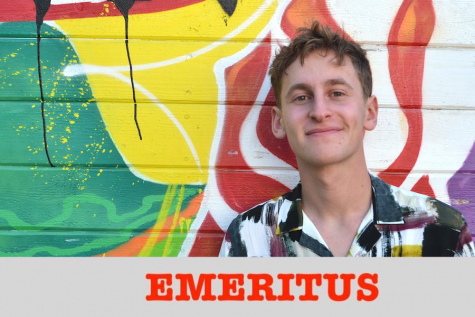
Jacob Joseph Lefkowitz Brooks was editor-in-chief during the 2019-20 school year and is now a student at the University of Toronto.

